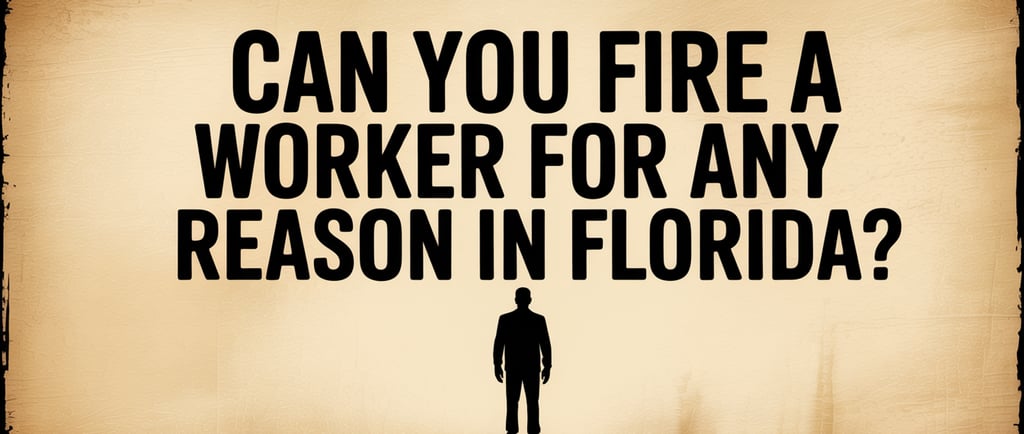Is Florida an At-Will State?
If you own a small business in Florida, understanding your rights and responsibilities when it comes to employment can feel like navigating a maze without a map. One question I hear all the time is, “Is Florida an at-will state?” The answer is yes, but what that really means for you as a business owner goes much deeper—and getting it right can save you from costly legal troubles and help build a respectful workplace.
HRTERMINATION
Jeremy Golan
7/21/20254 min read


Is Florida an At-Will State? What Small Business Owners Need to Know to Protect Their Business and Employees
If you own a small business in Florida, understanding your rights and responsibilities when it comes to employment can feel like navigating a maze without a map. One question I hear all the time is, “Is Florida an at-will state?” The answer is yes, but what that really means for you as a business owner goes much deeper—and getting it right can save you from costly legal troubles and help build a respectful workplace.
Let me walk you through what “at-will” really means, why it matters for your business, and how you can handle employee terminations in a way that protects you, respects your staff, and keeps your business sailing smoothly.
What Does “At-Will Employment” Mean in Florida?
In Florida, employment is generally considered “at-will,” meaning either the employer or the employee can end the employment relationship at any time, for any reason—or no reason at all—without warning. This flexibility gives you, the business owner, a lot of control. But it also comes with responsibilities.
Here’s the legal backbone: Florida courts recognize that unless there is a contract stating otherwise, either party can terminate employment at will. That means you don’t have to give a reason for firing someone—but you can’t fire someone for illegal reasons, like discrimination or retaliation.
Why Knowing This Matters for Small Business Owners
Imagine this: You’re running a small restaurant or retail shop. Things get busy, and maybe an employee’s performance slips. Maybe they don’t show up on time, or customer complaints start piling up. You need to make a decision to protect your business—but you want to do it right.
Here’s where knowing Florida’s at-will law helps. Because it means you can terminate employees when you need to without being locked into long contracts or months of notice. But it also means you must be careful and professional in how you handle these situations to avoid misunderstandings or lawsuits.
The Human Side: Your Employees Have Feelings — But You’re the Captain of the Ship
I get it. Firing someone isn’t fun. People have lives, families, and bills to pay. They might feel hurt or betrayed when you let them go. And honestly, I’ve seen business owners freeze because they don’t want to upset anyone, only for problems to snowball and damage the business more.
That’s why I always tell clients: You’re the captain of your ship. You’re steering the business through rough waters and calm seas alike. Making hard decisions is part of the job.
But here’s the trick—you can be firm and fair at the same time.
How to Structure Terminations to Protect Your Business
One way to be fair is by having a clear, consistent process for handling terminations. Here’s what I advise small business owners:
1. Document Performance and Behavior Issues
Keep notes on attendance problems, missed deadlines, or behavior issues. This isn’t about “building a case” to get someone fired, but about having facts if things go sideways. For example, if Maria shows up late three times in a week despite warnings, jot it down.
2. Communicate Clearly and Early
If an employee’s performance is slipping, talk to them early and clearly. Say what you expect and ask if they need support. Sometimes, problems come from misunderstandings or outside issues, and an honest chat can fix things.
3. Follow Company Policies Consistently
If you have an employee handbook or written policies, make sure to follow them to the letter. This protects you legally and sets clear expectations for employees.
4. Conduct a Respectful Termination Meeting
When it’s time to part ways, keep it professional and kind. Explain the reasons (without getting personal), listen briefly if they want to talk, and give them information on their final paycheck, benefits, or next steps.
5. Offer Support Where Possible
Sometimes small businesses can offer referrals, letters of recommendation (if appropriate), or resources to help the employee transition. It’s a goodwill gesture that leaves the door open for positive relationships later.
Real-Life Example: How a Small Retailer Avoided a Lawsuit
One of my clients owns a small boutique in Orlando. They had an employee who wasn’t meeting sales targets and was often late. Instead of waiting until it was a huge problem, the owner documented every conversation, gave clear warnings, and explained what improvement looked like.
When termination was necessary, it was done respectfully, with a final meeting outlining everything clearly. Because the process was fair and transparent, the employee left without incident, and no legal claims followed.
The Benefits of Knowing Your Rights—and Your Employees’ Rights
Understanding that Florida is an at-will state means you’re empowered to run your business your way—but it also means you need to respect boundaries.
For example:
You cannot fire someone for reasons related to race, gender, religion, disability, or other protected categories.
You cannot retaliate against an employee who complains about harassment or safety violations.
You should be aware of federal and state laws that affect specific industries or types of employees.
Knowing these rules helps you avoid costly lawsuits or penalties—and shows your employees you’re serious about fairness.
Tips for Small Business Owners to Stay on the Right Side of the Law
Have a clear employee handbook that explains your policies and at-will employment status.
Train managers and supervisors on how to handle terminations and disciplinary actions.
Keep all employment records organized and up to date.
Consult with an HR professional or employment lawyer if you’re unsure about a tricky situation.
Practice empathy, but stay firm. Your business depends on your leadership.
Wrapping Up: You’re Not Alone — I’m Here to Help
Being a small business owner is tough. You wear many hats and make decisions that impact not just your bottom line, but real people’s lives. Understanding Florida’s at-will employment law is a powerful tool in your toolkit—it lets you protect your business while treating your team with respect.
If you ever feel stuck or unsure, don’t hesitate to reach out. I’m here to help you navigate these challenges, build strong HR practices, and keep your business thriving.
Remember: You’re the captain. You can steer your business through calm seas and storms alike. And with the right knowledge and tools, you’ll come out stronger every time.
Your total HR Solution!
We take care of the "heavy lifting" so you can soar!
Support
Certified, experienced and insured.
924 N. Magnolia Ave, Suite 202-5448
Orlando, FL 32803
© 2025. All rights reserved.
